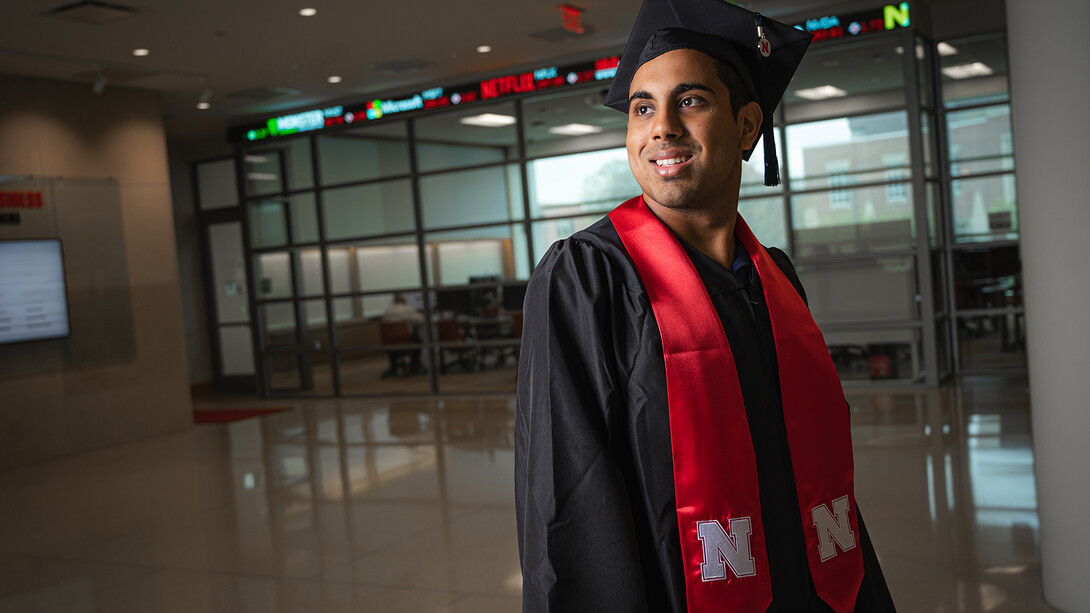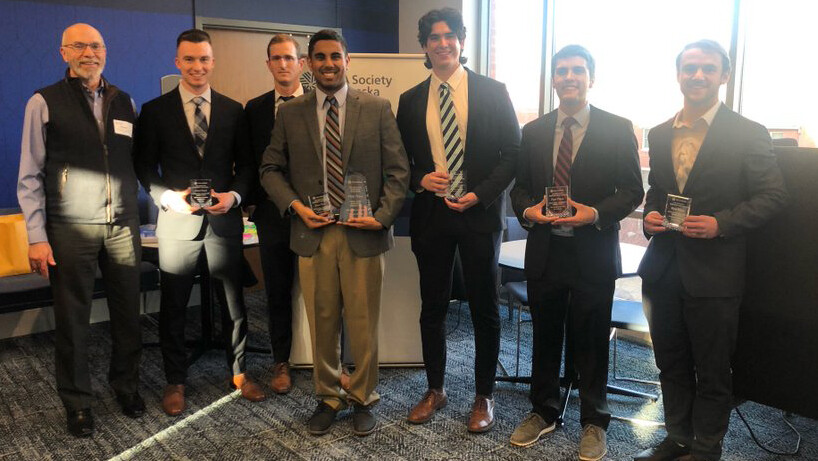
As Ananth Venkatachalam witnessed the extreme effects of the COVID-19 pandemic on financial markets, he started envisioning his own role in finance.
After changing his major from chemical engineering to finance and honing skills through involvement at the College of Business, he graduates May 14 ready to start as a tech analyst in the risk and financial advisory practice at Deloitte in Omaha.
“At the beginning of COVID, we faced a recession and we saw so much that has changed, not just from the way we conduct business, but more importantly, how the financial markets were impacted from a macroeconomic standpoint and also investments in general,” Venkatachalam said. “I thought that is exactly where I need to be leveraging my analytical, mathematical and programming skills.”
For his new major, he took core business courses like Business Analytics/Information Analysis (SCMA 350) and Data Modeling and Computing (SCMA 450), which advanced his analytical abilities. While learning new software and a statistical programming language excited Venkatachalam, it was Leon Xu, assistant professor of supply chain management and analytics, that made the classes memorable.
“Dr. Xu influenced my life because he’s reinforced the concept again and again about how business analytics is so important and how it’s going to impact in operation,” Venkatachalam said. “He is so passionate about this topic and the projects we’ve done with COVID data and regression analysis on housing prices have really influenced me and how I see him as a mentor.”
Venkatachalam not only grew his skills in his business coursework, but he also quickly sought out opportunities to apply what he was learning. He joined the Big Red Investment Club, where students learn how to invest by managing a real investment portfolio.
“BRIC has been a big part of my life. I have made a lot of friends through it, and it’s also influenced my career as well,” he said. “I currently serve as its vice president and director of research where I help find new investment opportunities for our portfolio. It’s grown my interest in financial analytics and consulting.”
Developing real friendships in the club led to other meaningful collaborations like joining the inaugural cohort of the Husker Venture Fund, a student-led fund investing in early-stage Nebraska startups. After multiple weeks of an intensive venture capital bootcamp, he and other members completed the due diligence to select their first investment.
These experiences meant he did not have to wait until graduation to apply the skills he learned in class. His involvement exemplifies Nebraska’s student engagement, which ranks in the top 10% of all colleges reviewed by the Wall Street Journal.
“Ananth is an energetic student who is always willing to learn and participate. He is also willing to extend the learning experience outside the classroom,” Xu said.
With parents who work in higher education, Venkatachalam spent his life growing up in academia, seeing the many ways people could positively impact students. Believing in the power of every person, he leveraged his academic talents to tutor others through the Teaching and Learning Center at the College of Business.
“I wanted to give back and stress important concepts. Students could learn with me in a one-on-one setting to build upon what they were hearing in the classroom,” he said.
Tutoring called him to action in another way — advocating for underrepresented students studying business.
“I wanted to see how we can help our first-generation college students and students of color navigate the business workplace because it is not an easy environment to go through,” he said. “Diversity and inclusion was never really something I wanted to pursue, but when I first started out, I missed seeing a vibrant minority community in the College of Business.
“Through my involvement, I’ve learned to understand the role (diversity, equity and inclusion) is going to play in the future of business.”
His supervisor in the Teaching and Learning Center asked him to serve as a pilot student in a new program called Inclusive Business Leaders. His feedback helped the college launch the scholarship program for first-year underrepresented students.
“We regularly discussed difficult and challenging topics with the pilot students, and Ananth was always very skillful in analyzing all aspects of an issue and asking critical questions of himself and others. He is someone who can vocalize the change he wants to see and then follows through with the actions to make it possible,” said Kasey Linde, associate director of the TLC and program coordinator for Inclusive Business Leaders.
From that experience, he was asked to also serve on the college’s Inclusive Excellence Advisory Board, which establishes and tracks DEI goals. Through these efforts, Venkatachalam looks to break the stereotypes often seen in his field of study.
“When we think of finance stereotypically, it’s often viewed as a profession where you’re seeing only white people, but I wanted to bring my perspective as a finance person and as a person of color and see how I could make an impact in this area,” he said.
Getting involved on campus and in the College of Business turned into one of the best decisions Venkatachalam made for himself at Nebraska.
“All of these clubs and experience have shaped my life. They’ve inspired me to give back to people, and I probably would not have learned all the skills that I currently have right now without them,” he said.

For Venkatachalam, he found that Nebraska supported him every step of the way to his dream job — even during a pandemic. He developed critical career skills both in and out of the classroom and alongside peers in clubs, special programs and case competitions, like winning the state’s Charter Financial Analyst Research Challenge. His job at Deloitte allows him to put to practice all the experience he gained at the college.
“I’m really excited to be working with clients and apply the knowledge I’ve learned as a finance major and business analytics minor into a lot of the work that we’ll be doing,” Venkatachalam said.







